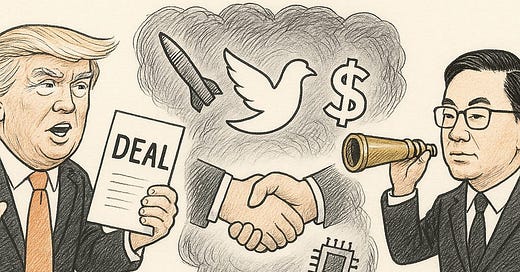Professor Wang Jisi (王缉思) is one of China’s most respected international relations scholars, whose views have shaped a long line of Chinese scholars, diplomats and policymakers. After spending a decade working in the countryside as a sent-down youth during and just after the Cultural Revolution, Wang went on to build a distinguished academic career spanning more than four decades—marked by his moderate, internationalist and liberal-leaning outlook. Now 76, he continues to serve as an important bridge between China and the United States, advocating tirelessly for dialogue, trust-building and cooperation.
He and the editorial team at the Contemporary American Review (当代美国评论) have kindly allowed this newsletter to share extensive excerpts from his latest interview, published last month. Perhaps its most striking feature is Wang’s deep dismay over the state of American society and politics. Unlike some of his more hawkish peers, whose tone often veers towards schadenfreude and nationalistic hubris, Wang expresses more alarm than triumphalism. He appears to view the return of Trump and his MAGA movement less as a source of opportunity for China, than as a growing danger to the increasingly fragile US–China relationship. As he puts it, “Trump's goal of ‘making America great again’ is fundamentally at odds with our aspiration for the great rejuvenation of the Chinese nation.”
The following is an excerpt; read the original article HERE.
Key Points
American society is becoming less safe, less ethically minded and more hostile to outsiders.
Trump’s foreign policy has been marked by chaos and improvisation. China should pay less attention to what he says and more to what he does.
• Wang: “Once American hegemony has cast aside moral taboos and broken through domestic constraints, its government may well take actions previously deemed unimaginable.”
Trump alone cannot end the Russia–Ukraine conflict, as US policy is shaped by broader political forces and European allies are unlikely to simply follow his lead.
Similarly, tensions between the US and Russia are too entrenched for bilateral relations to be repaired merely because Trump wants them to.
Trump’s return may strain America’s international relations, but the West will not fracture, and the US alliance system in East Asia remains strong.
US soft power is in long-term decline, driven by democratic dysfunction at home, unpopular policies abroad and Washington’s growing disregard for international law.
Still, the emergence of a global "anti-US alliance" is unlikely, and “contrary political systems” have yet to prove more attractive.
Despite its waning soft power, America’s hard power continues to grow.
The US and China are pulling further ahead as the world’s two uncontested superpowers. America’s long-term growth potential matches China’s, and the balance of power between them has yet to be fundamentally altered.
Russia, by contrast, faces increasingly constrained economic prospects and diminishing overall strength.
The Scholar
Name: Wang Jisi (王缉思)
Date of birth: Nov. 1948 (age: 76)
Position: Boya Chair Professor Emeritus, School of International Studies, Peking University
Formerly: Founding President (2013-2022), Institute of International and Strategic Studies, Peking University; Dean (2005-2013), School of International Studies, Peking University; Director (2001-2009), Institute of International Strategic Studies, Central Party School; Director (1993-2005), Institute of American Studies, Chinese Academy of Social Sciences (CASS)
Other: Member of the Foreign Policy Advisory Committee of China’s Ministry of Foreign Affairs (2008-2016)
Research focus: US foreign policy; US-China relations; Security in East Asia
Education: BA-MA Peking University (1978-1983); Worked as a sent-down youth in Inner Mongolia and Henan during the Cultural Revolution (1968–1976), before returning to Beijing to resume his studies in 1978.
Experience abroad: University of Oxford (1982-83); UC Berkeley (1984-85); University of Michigan (1990-91); Claremont McKenna College (2001) etc.
Reprint originally from:




